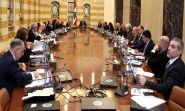
With the arrival of Storm Adam and a significant drop in temperatures, it is crucial to take precautionary measures to mitigate the risks associated with extreme cold, heavy rainfall in some areas and hazardous road conditions. Lebanon’s meteorological service forecasts heavy snowfall and ice at high altitudes, particularly from Friday night into Saturday, as temperatures continue to fall.
The Internal Security Forces (ISF) have issued safety recommendations tailored to different regions and conditions.
In mountainous areas, residents are advised to ensure they have sufficient stocks of fuel or firewood for heating. Authorities also recommend staying home unless absolutely necessary to minimize risks associated with the extreme weather.
For heating appliances, regular cleaning of burners is essential to ensure they function properly. It is also important to inspect electric and gas heaters to prevent potential malfunctions.
Moreover, flame-based heaters should never be left on while sleeping or when leaving home to reduce the risk of household accidents. Proper ventilation is also crucial when using coal, wood or gas heaters to prevent carbon monoxide poisoning.
Along the coast, people are advised to stay away from seawalls and billboards, which could be blown out by strong winds. Attempting to cross flooded roads is also strongly discouraged, as the water may conceal serious dangers.
When driving, it is essential to avoid traveling in mountainous areas unless absolutely necessary and to strictly follow the instructions of the Road Safety Service. Before setting out, a full vehicle check is recommended, including tires, windshield wipers, lights and the battery.
Driving under the influence of alcohol is strictly prohibited, and extra caution is crucial — speeding or reckless driving should be avoided, especially when icy conditions are expected.
Motorists should also equip their vehicles with tire chains and carry an emergency kit, including a spare tire, essential medications and a means of communication in case of unforeseen conditions.
In case of emergency, citizens can contact the ISF at 112 or the Civil Defense at 125.



Comments